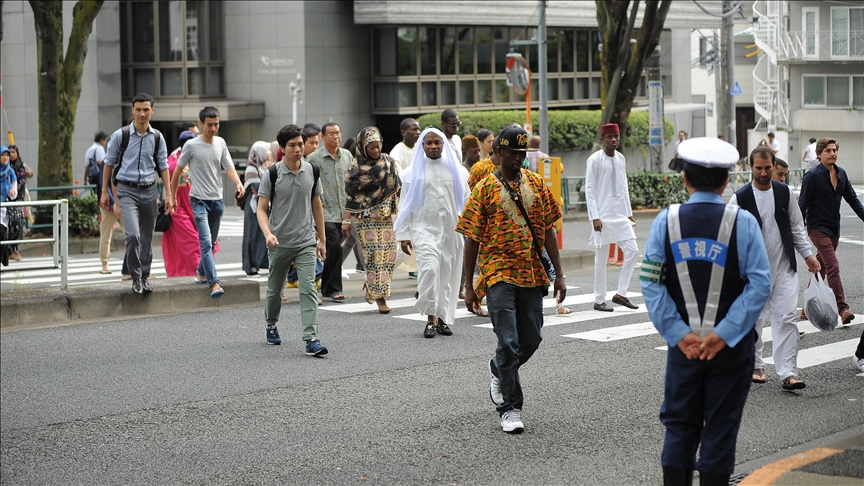Anti-Muslim sentiment in Japan on rise after Israel's attacks on Gaza
US’ pro-Israel stance during Gaza attacks has led Japanese to become anti-Palestinian, anti-Muslim, academic tells Anadolu
 Tokyo Mosque, Tokyo, Japan ( David Mareuil - Anadolu Agency )
Tokyo Mosque, Tokyo, Japan ( David Mareuil - Anadolu Agency )
ISTANBUL
Anti-Muslim sentiment in Japan is on the rise after Israeli attacks on Gaza, according to a Japanese academic.
Kayyim Naoki Yamamoto, a member of Marmara University Institute of Turkic Studies, told Anadolu that there has been an increase in the anti-Muslim and anti-Palestinian sentiments in his country following the Oct. 7, 2023 attacks.
Yamamato, who was introduced to Islam 15 years ago and has been continuing his academic studies in Türkiye for years, said that hate speech against Muslims has increased with the rise in the votes of far-right parties in Japan.
The academic stressed that xenophobia (hatred against foreigners), which has existed in the East Asian country for many years, turned into anti-Muslim after Israel's attacks on Gaza.
"Japan is currently experiencing a negative change,” he said. “Xenophobia and anti-Muslim sentiments have increased exponentially in the last 15 years.”
“The Japanese government does not realize what kind of a problem the growing anti-Muslim sentiment will create,” he warned.
Pointing out that anti-Muslim sentiment in the country has been on the rise like never before, Yamamoto said: "Japanese people already follow the US politically and socially.”
“The US' pro-Israel stance during the Gaza attacks caused the Japanese to become anti-Palestinian and anti-Muslim,” he stressed.
He noted that the Japanese people, who support Israel, also pioneered anti-Muslim campaigns in the country, mentioning that pro-Israel lobbies spread hatred not only against Palestine but also against other Muslim countries.
Israel has waged a deadly military offensive, now in its 152nd day, on the Gaza Strip since an Oct. 7 Hamas attack, which Tel Aviv said killed nearly 1,200 people.
More than 30,700 Palestinians have since been killed and over 72,000 others injured amid mass destruction and shortages of necessities.
Israel has also imposed a crippling blockade on the Gaza Strip, leaving its population, particularly residents of northern Gaza, on the verge of starvation.
The Israeli war has pushed 85% of Gaza’s population into internal displacement amid acute shortages of food, clean water, and medicine, while 60% of the enclave's infrastructure has been damaged or destroyed, according to the UN.
Israel stands accused of genocide at the International Court of Justice. An interim ruling in January ordered Tel Aviv to stop genocidal acts and take measures to guarantee that humanitarian assistance is provided to civilians in Gaza.
Disinformation by extreme far-right
The academic further indicated that anti-Muslim sentiment in Japan will continue to increase.
"Young Japanese are no longer marrying and the population is not growing, but foreigners are marrying and having many children,” he said.
“Moreover, the increase in Japanese marrying foreigners causes the fascists in the country to get angry and target Muslims,” he opined.
“Japan has never been a society open to foreign cultures throughout its history,” he emphasized, adding: “Japan has never lived with so many foreigners at any time in its history. We have no such experience."
Pointing out that Japan, which is among the countries with aging people, needs a foreign labor force, Yamamato said: "The Japanese government's move to bring people from abroad to work has triggered xenophobia in the country."
Far-right groups in the country are trying to create public opinion by reporting the negative aspects of immigrants, the academic said, mentioning: "Far-right groups are spreading disinformation that if foreigners come to the country, there will be no good future and economy.”
“They say: 'We need to protect Japan from foreigners and Muslims. Japan belongs to the real Japanese, we need to do something against this invasion',” he stated.
Converting to Islam
Yamamato also said that he was introduced to Islam 15 years ago, thanks to his university professor and that he started studying classical Arabic at Kyoto University before accepting Islam.
Explaining that he went to the Egyptian capital Cairo on the advice of his university professor and became a Muslim there, he said: "Before I became a Muslim, I read and analyzed books of other religions, but none of them appealed to me.”
“I was looking for a religion that lived among the community ... I was not looking for something individualistic that was only tied to a chain of rules,” he stressed.
“I went to Cairo during Ramadan and I was impressed by their solidarity with each other and I became a Muslim,” he recalled, adding: “In Cairo, I saw that the humanitarian spirit that existed in Japan but had been lost was still there.”
The academic stated that his non-religious family did not react negatively to his conversion, but that other Japanese families may react to this situation: "New Japanese Muslims have problems because they have converted.”
“Whether this reaction is big or small varies from family to family," he added.
Rise of far-right in Japan
Far-right activist movements in the Japanese political scene, which started in small masses in the early 2000s, have spread over time.
The far-right group Zaitokukai, founded in 2006, began protests claiming that "Koreans, Chinese and other immigrants will invade Japan.”
The group's founder, Makoto Sakurai, increased his 1.8% of the vote in the Tokyo gubernatorial election in 2016 to 2.9% in the 2020 election.
Zaitokukai, which often brings together anti-foreigner youth on social media platforms, argues: “Japan belongs only to Japanese people and that foreigners are an obstacle to the country's progress.”
*Writing by Merve Berker








